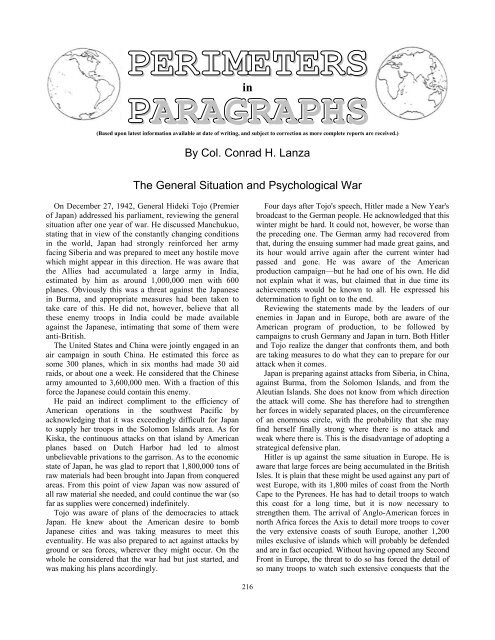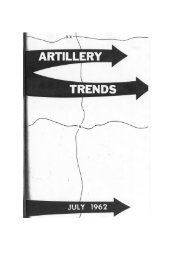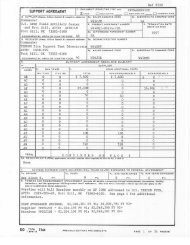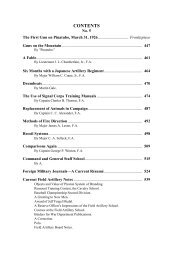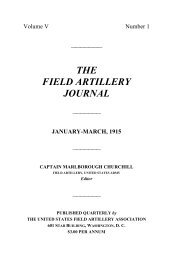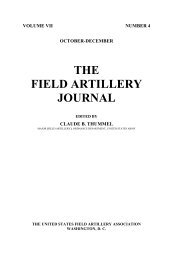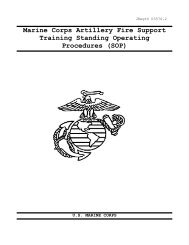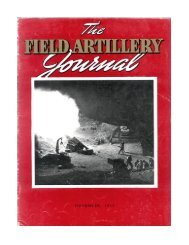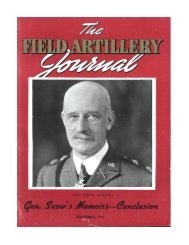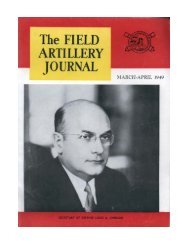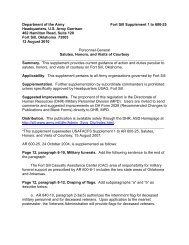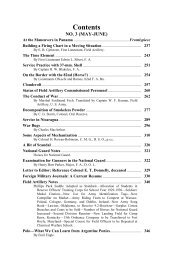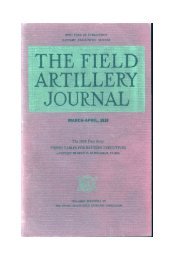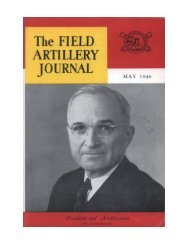the field artillery journal - Fort Sill - U.S. Army
the field artillery journal - Fort Sill - U.S. Army
the field artillery journal - Fort Sill - U.S. Army
You also want an ePaper? Increase the reach of your titles
YUMPU automatically turns print PDFs into web optimized ePapers that Google loves.
PERIMETERS<br />
in<br />
PARAGRAPHS<br />
(Based upon latest information available at date of writing, and subject to correction as more complete reports are received.)<br />
By Col. Conrad H. Lanza<br />
The General Situation and Psychological War<br />
On December 27, 1942, General Hideki Tojo (Premier<br />
of Japan) addressed his parliament, reviewing <strong>the</strong> general<br />
situation after one year of war. He discussed Manchukuo,<br />
stating that in view of <strong>the</strong> constantly changing conditions<br />
in <strong>the</strong> world, Japan had strongly reinforced her army<br />
facing Siberia and was prepared to meet any hostile move<br />
which might appear in this direction. He was aware that<br />
<strong>the</strong> Allies had accumulated a large army in India,<br />
estimated by him as around 1,000,000 men with 600<br />
planes. Obviously this was a threat against <strong>the</strong> Japanese<br />
in Burma, and appropriate measures had been taken to<br />
take care of this. He did not, however, believe that all<br />
<strong>the</strong>se enemy troops in India could be made available<br />
against <strong>the</strong> Japanese, intimating that some of <strong>the</strong>m were<br />
anti-British.<br />
The United States and China were jointly engaged in an<br />
air campaign in south China. He estimated this force as<br />
some 300 planes, which in six months had made 30 aid<br />
raids, or about one a week. He considered that <strong>the</strong> Chinese<br />
army amounted to 3,600,000 men. With a fraction of this<br />
force <strong>the</strong> Japanese could contain this enemy.<br />
He paid an indirect compliment to <strong>the</strong> efficiency of<br />
American operations in <strong>the</strong> southwest Pacific by<br />
acknowledging that it was exceedingly difficult for Japan<br />
to supply her troops in <strong>the</strong> Solomon Islands area. As for<br />
Kiska, <strong>the</strong> continuous attacks on that island by American<br />
planes based on Dutch Harbor had led to almost<br />
unbelievable privations to <strong>the</strong> garrison. As to <strong>the</strong> economic<br />
state of Japan, he was glad to report that 1,800,000 tons of<br />
raw materials had been brought into Japan from conquered<br />
areas. From this point of view Japan was now assured of<br />
all raw material she needed, and could continue <strong>the</strong> war (so<br />
far as supplies were concerned) indefinitely.<br />
Tojo was aware of plans of <strong>the</strong> democracies to attack<br />
Japan. He knew about <strong>the</strong> American desire to bomb<br />
Japanese cities and was taking measures to meet this<br />
eventuality. He was also prepared to act against attacks by<br />
ground or sea forces, wherever <strong>the</strong>y might occur. On <strong>the</strong><br />
whole he considered that <strong>the</strong> war had but just started, and<br />
was making his plans accordingly.<br />
216<br />
Four days after Tojo's speech, Hitler made a New Year's<br />
broadcast to <strong>the</strong> German people. He acknowledged that this<br />
winter might be hard. It could not, however, be worse than<br />
<strong>the</strong> preceding one. The German army had recovered from<br />
that, during <strong>the</strong> ensuing summer had made great gains, and<br />
its hour would arrive again after <strong>the</strong> current winter had<br />
passed and gone. He was aware of <strong>the</strong> American<br />
production campaign—but he had one of his own. He did<br />
not explain what it was, but claimed that in due time its<br />
achievements would be known to all. He expressed his<br />
determination to fight on to <strong>the</strong> end.<br />
Reviewing <strong>the</strong> statements made by <strong>the</strong> leaders of our<br />
enemies in Japan and in Europe, both are aware of <strong>the</strong><br />
American program of production, to be followed by<br />
campaigns to crush Germany and Japan in turn. Both Hitler<br />
and Tojo realize <strong>the</strong> danger that confronts <strong>the</strong>m, and both<br />
are taking measures to do what <strong>the</strong>y can to prepare for our<br />
attack when it comes.<br />
Japan is preparing against attacks from Siberia, in China,<br />
against Burma, from <strong>the</strong> Solomon Islands, and from <strong>the</strong><br />
Aleutian Islands. She does not know from which direction<br />
<strong>the</strong> attack will come. She has <strong>the</strong>refore had to streng<strong>the</strong>n<br />
her forces in widely separated places, on <strong>the</strong> circumference<br />
of an enormous circle, with <strong>the</strong> probability that she may<br />
find herself finally strong where <strong>the</strong>re is no attack and<br />
weak where <strong>the</strong>re is. This is <strong>the</strong> disadvantage of adopting a<br />
strategical defensive plan.<br />
Hitler is up against <strong>the</strong> same situation in Europe. He is<br />
aware that large forces are being accumulated in <strong>the</strong> British<br />
Isles. It is plain that <strong>the</strong>se might be used against any part of<br />
west Europe, with its 1,800 miles of coast from <strong>the</strong> North<br />
Cape to <strong>the</strong> Pyrenees. He has had to detail troops to watch<br />
this coast for a long time, but it is now necessary to<br />
streng<strong>the</strong>n <strong>the</strong>m. The arrival of Anglo-American forces in<br />
north Africa forces <strong>the</strong> Axis to detail more troops to cover<br />
<strong>the</strong> very extensive coasts of south Europe, ano<strong>the</strong>r 1,200<br />
miles exclusive of islands which will probably be defended<br />
and are in fact occupied. Without having opened any Second<br />
Front in Europe, <strong>the</strong> threat to do so has forced <strong>the</strong> detail of<br />
so many troops to watch such extensive conquests that <strong>the</strong>


